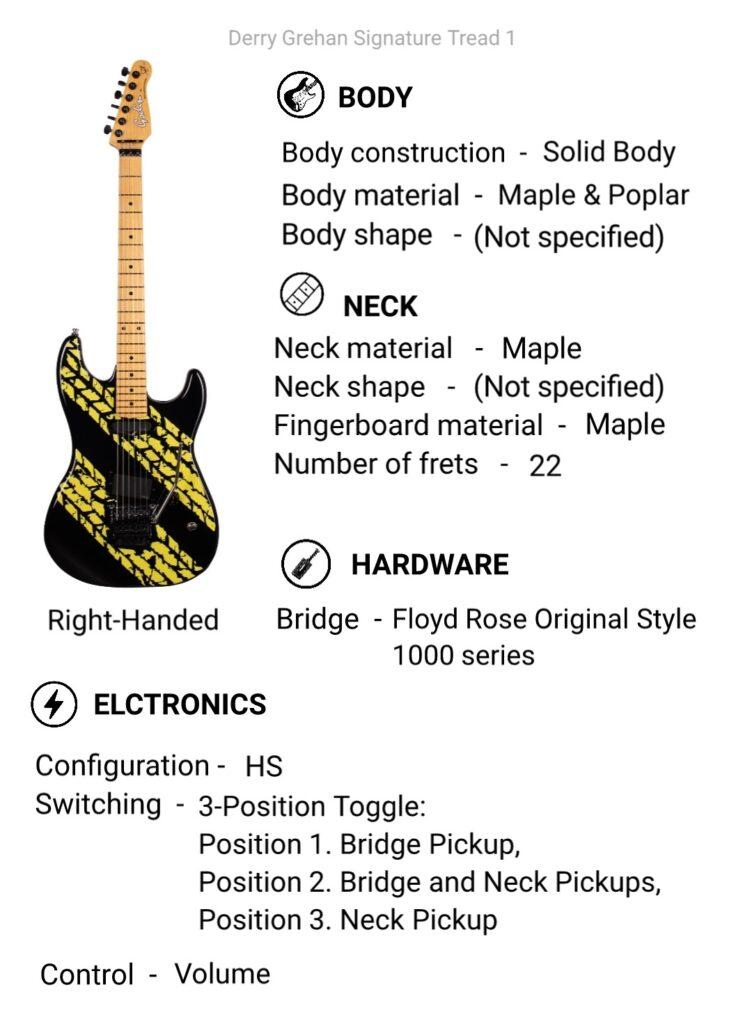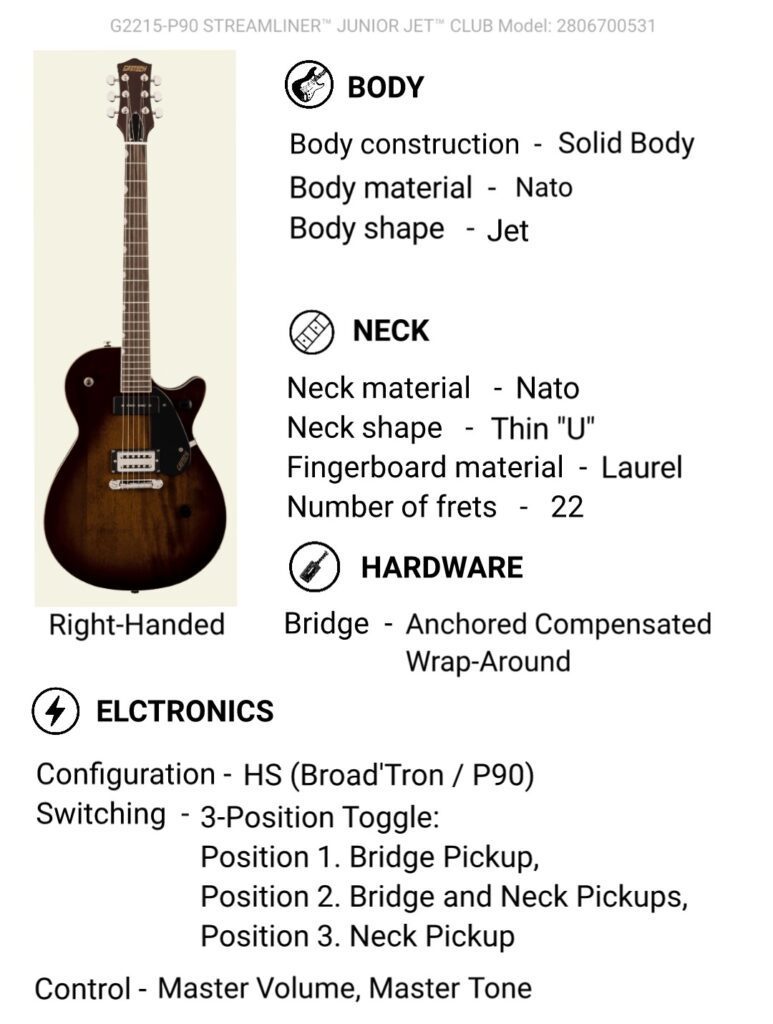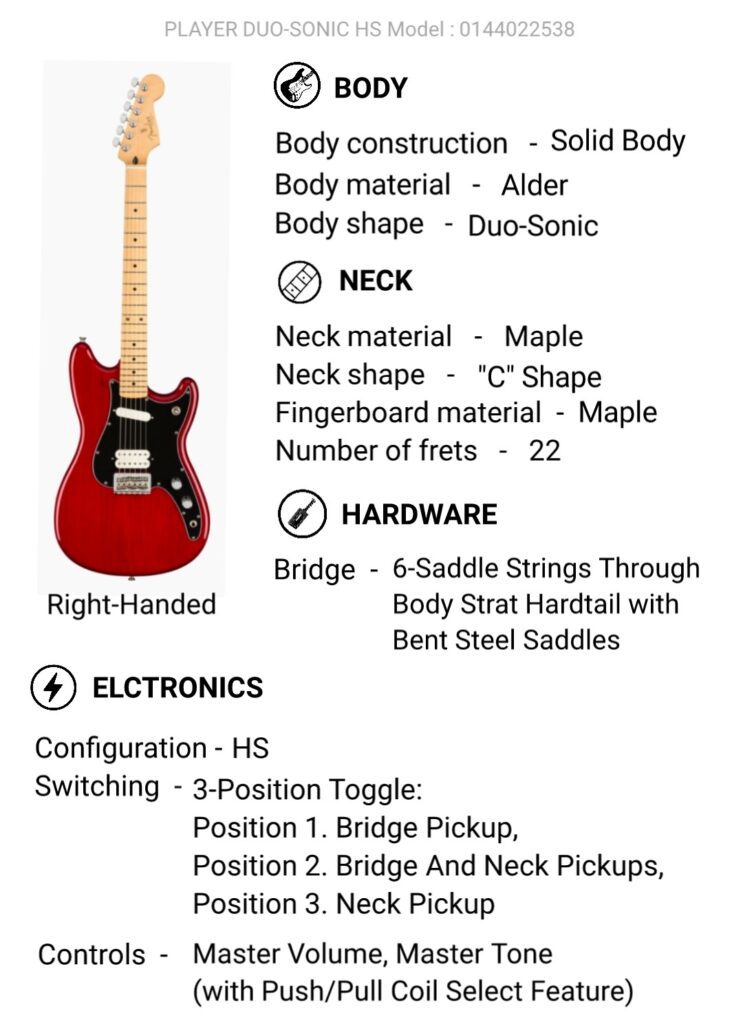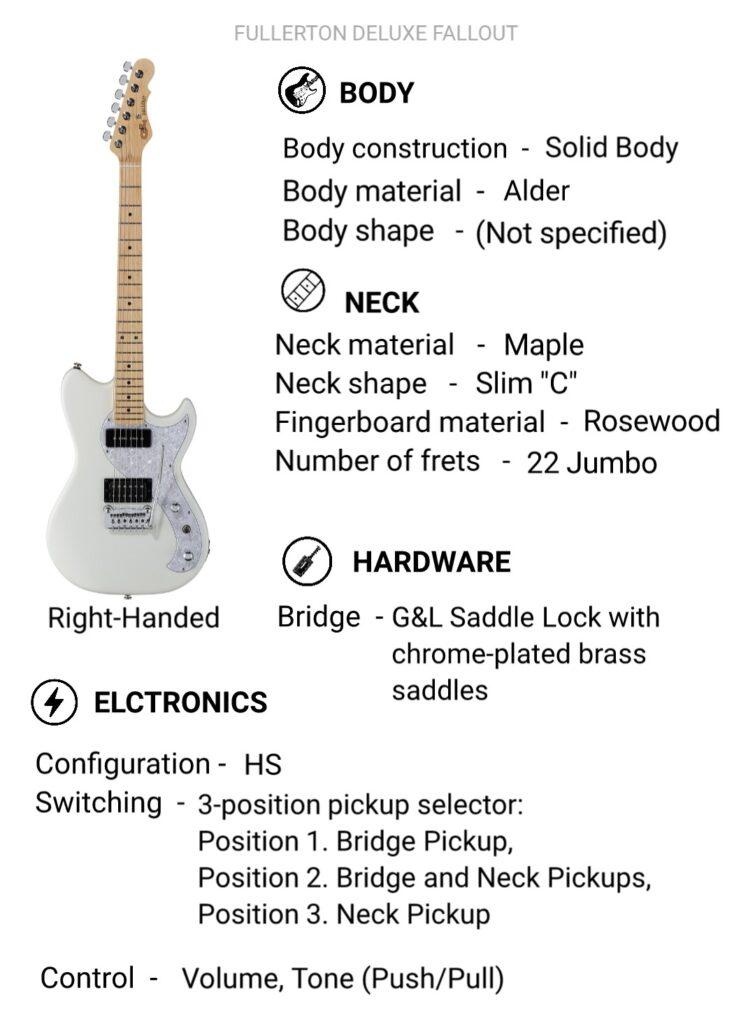List of Best HS (humbucker single-coil) electric guitar with features and specifications, You can compare electric guitar
prices on different online stores.
Godin Derry Grehan Signature Tread 1

Gretsch G2215-P90 Streamliner Junior Jet Club

Read More
 Amazon.in
Amazon.in  ₹ 32,985
₹ 32,985  Go To Store
Go To Store
 Amazon.in
Amazon.in  ₹ 32,985
₹ 32,985  Go To Store
Go To Store
 Amazon.com
Amazon.com  $ 399
$ 399  Go To Store
Go To Store
 Amazon.com
Amazon.com  $ 399
$ 399  Go To Store
Go To Store
 Guitar Center
Guitar Center  $ 399
$ 399  Go To Store
Go To Store
 Thomann
Thomann  $ 325
$ 325  Go To Store
Go To Store
 Thomann
Thomann  $ 325
$ 325  Go To Store
Go To Store
Fender Player Duo Sonic HS

Introduction: The HS (Humbucker-Single Coil) electric guitar configuration offers a versatile blend of tonal characteristics, combining the warmth and power of a humbucker pickup with the clarity and sparkle of a single-coil pickup. This configuration has gained popularity among guitarists seeking a versatile instrument capable of covering a wide range of musical styles. In this article, we’ll explore the features, benefits, and considerations of HS electric guitars.
”Read_More”
Features of HS Electric Guitars:
- Humbucker Pickup: Positioned in the bridge position, the humbucker pickup delivers thick, rich tones with enhanced sustain and midrange presence. Humbuckers are known for their high output and noise-cancelling properties, making them ideal for high-gain and distortion-heavy playing styles.
- Single-Coil Pickup: Located in the neck position, the single-coil pickup provides bright, articulate tones with crisp highs and tight bass response. Single-coils offer clarity and definition, making them well-suited for clean and lightly overdriven tones, as well as genres like blues, country, and funk.
- Selector Switch: HS guitars typically feature a pickup selector switch that allows players to choose between using the humbucker, the single-coil, or a combination of both pickups simultaneously. This provides a wide range of tonal options, from fat and punchy to bright and chiming.
- Tone Controls: Many HS guitars come equipped with tone controls that allow players to adjust the EQ of each pickup independently, further expanding the sonic possibilities. This enables players to fine-tune their tone to suit different playing styles and musical genres.
Considerations for HS Electric Guitars:
- Tonewood and Construction: The choice of tonewood and construction methods can significantly impact the overall sound and feel of an HS guitar. Different woods and construction techniques can emphasize certain tonal characteristics, so it’s essential to consider how these factors influence the instrument’s sonic profile.
- Pickup Configuration: While the HS configuration offers a versatile blend of tones, some players may prefer specific pickup combinations for their playing style. Experimenting with different pickup configurations can help players find the perfect balance of warmth, clarity, and power for their needs.
- Setup and Adjustment: Like any electric guitar, HS guitars may require setup and adjustment to achieve optimal playability and tone. Factors such as string gauge, action height, and pickup height can all affect the guitar’s feel and sound, so it’s essential to ensure that the instrument is properly set up to suit the player’s preferences.
In conclusion, HS electric guitars offer a versatile and balanced tonal platform that appeals to a wide range of players and musical styles. With their combination of humbucker power and single-coil clarity, HS guitars provide the flexibility and sonic diversity needed to excel in any musical situation. Whether you’re shredding through high-gain riffs or laying down smooth jazz chords, an HS guitar can deliver the tones you desire with style and precision.
For which Genres of music is the HS pickup configuration suitable?
The HS (Humbucker-Single Coil) pickup configuration is a versatile option that blends the warmth and power of a humbucker with the clarity and sparkle of a single-coil pickup. This hybrid setup offers a wide range of tonal possibilities, making it suitable for various genres of music.
- Rock: The HS configuration is well-suited for rock music, including classic rock, alternative rock, and hard rock. The humbucker provides thick, punchy tones ideal for driving rhythm parts and aggressive lead playing, while the single-coil offers clarity and articulation for dynamic clean passages and crunchy overdriven tones.
- Blues: Blues guitarists appreciate the versatility of the HS setup for its ability to deliver both warm, soulful tones and gritty, biting sounds. The humbucker provides fat, smooth tones for emotive lead playing and expressive bends, while the single-coil offers crisp, bell-like tones for clean passages and bluesy licks.
- Pop: In pop music, the HS configuration offers a balance of warmth and clarity that complements the genre’s melodic sensibilities. Whether playing shimmering chord progressions, funky rhythms, or catchy lead lines, the HS pickup configuration provides the versatility needed to cover a wide range of pop styles and textures.
- Fusion: Fusion music, which blends elements of jazz, rock, and funk, benefits from the HS pickup configuration’s ability to deliver a diverse range of tones. From smooth jazz chords and melodic improvisations to fiery rock-infused solos, the HS setup offers the tonal flexibility required for intricate fusion compositions.
- Country: While country music often favors traditional single-coil pickups, the HS configuration can provide a modern twist on classic country tones. The humbucker adds warmth and thickness to twangy country rhythms and chicken-picked leads, while the single-coil offers brightness and clarity for clean, sparkling tones.
- Indie: Indie music encompasses a wide range of styles, from dreamy shoegaze to upbeat indie rock. The HS pickup configuration’s versatility makes it well-suited for indie guitarists seeking a blend of vintage warmth and modern edge. Whether crafting lush ambient textures or jangly guitar riffs, the HS setup offers the sonic flexibility needed to explore diverse indie sounds.
Overall, the HS pickup configuration is a versatile choice that caters to a broad spectrum of musical styles. Its ability to blend the best characteristics of humbuckers and single-coils makes it a popular option for players who require versatility and expressiveness in their guitar tone.
How to choose right HS electric Guitar
When choosing the right HS (Humbucker-Single-Coil) electric guitar, consider the following factors to ensure it meets your playing style and musical preferences:
- Tonal Versatility: Determine the type of music you primarily play and whether you require a versatile instrument capable of covering a wide range of genres. HS guitars offer a blend of the warmth and power of a humbucker with the clarity and twang of a single-coil pickup, making them suitable for various styles including rock, blues, pop, country, and jazz.
- Pickup Configuration: Understand the specific HS pickup configuration of the guitar you’re considering. Some models feature a humbucker in the bridge position and a single-coil in the neck position, while others reverse this arrangement. This affects the guitar’s tonal balance, with the bridge humbucker delivering more aggressive tones for lead playing and the neck single-coil offering smoother, warmer tones for rhythm and clean passages.
- Playability: Pay attention to the guitar’s neck profile, fretboard radius, and overall feel. Determine whether you prefer a slim and fast-playing neck for shredding or a thicker neck for added stability and resonance. Consider factors such as fret size, fretboard material, and access to higher frets to ensure comfortable playability across the entire neck.
- Build Quality: Assess the build quality and craftsmanship of the guitar. Look for solid construction, quality tonewoods, and attention to detail in components such as hardware, electronics, and finishes. Higher-end models often feature premium materials and meticulous assembly, resulting in better overall performance and longevity.
- Sound and Tone: Listen to demos or try out the guitar in person to gauge its sound and tone. Experiment with different pickup configurations, amp settings, and playing techniques to assess the guitar’s sonic capabilities across various styles and settings. Pay attention to factors such as sustain, resonance, and dynamic response to ensure the guitar delivers the tone you desire.
- Aesthetics and Design: Consider the guitar’s aesthetics and design elements such as body shape, finish options, and hardware choices. Choose a guitar that appeals to your personal tastes and reflects your style as a player. Whether you prefer a classic, vintage-inspired look or a modern, sleek design, find a guitar that resonates with you visually.
- Budget: Set a realistic budget based on your financial constraints and the level of quality you require. Determine whether you’re willing to invest in a high-end instrument with premium features or if you’re seeking a more budget-friendly option that still delivers solid performance. Keep in mind that higher-priced guitars often offer better build quality, components, and overall playability.
By considering these factors and doing thorough research, you can select the right HS electric guitar that meets your needs, inspires creativity, and enhances your playing experience. Whether you’re a beginner or a seasoned pro, finding the perfect HS guitar can greatly impact your enjoyment and performance as a guitarist.
Pros and Cons HS electric Guitars
Pros:
- Versatility: HS electric guitars offer a versatile tonal range, blending the warmth and power of a humbucker pickup with the clarity and twang of a single-coil pickup. This versatility makes HS guitars suitable for various musical genres, from rock and blues to pop and jazz.
- Balanced Tone: The combination of a humbucker in the bridge position and a single-coil in the neck position provides a balanced tonal response. Players can achieve rich, full-bodied tones with enhanced bass and midrange from the humbucker, while the single-coil offers crisp, articulate highs and excellent clean tones.
- Dynamic Range: HS guitars excel in delivering a wide dynamic range, allowing players to go from smooth, mellow tones to aggressive, driven sounds with ease. This versatility makes HS guitars ideal for both rhythm and lead playing, accommodating a variety of playing styles and techniques.
- Reduced Noise: While not as noise-canceling as dual humbucker configurations, the inclusion of a single-coil pickup in the neck position adds some noise-canceling properties, resulting in reduced interference and hum compared to guitars equipped with single-coil pickups in both positions.
- Comfortable Playability: Many HS electric guitars feature ergonomic designs and comfortable neck profiles, making them suitable for extended playing sessions. Whether you prefer a slim, fast-playing neck or a more substantial profile for added stability, HS guitars offer options to accommodate different player preferences.
Cons:
- Limited Tonal Range: While HS guitars offer versatility, they may not excel in extreme tonal variations compared to guitars with different pickup configurations. Players seeking highly specialized tones may find other pickup configurations more suitable for their needs.
- Not Ideal for Traditional Tones: While HS guitars can cover a wide range of musical styles, they may not deliver the traditional tones associated with guitars equipped with single-coil pickups in both positions. Players seeking classic Stratocaster or Telecaster tones may prefer guitars with traditional SSS or T-style configurations.
- Potential for Noise: While the inclusion of a humbucker helps reduce noise and interference, HS guitars may still be susceptible to some degree of hum, especially in high-gain settings. Players in need of maximum noise reduction may prefer guitars with dual humbuckers or noiseless single-coil pickups.
Overall, HS electric guitars offer a balanced blend of tonal characteristics and versatility, making them a popular choice among players seeking a diverse range of sounds and playing styles. While they may not excel in specialized tones or noise reduction compared to other pickup configurations, HS guitars provide a well-rounded option for a wide variety of musical genres and applications.
History of HS electric Guitars
The history of HS (Humbucker-Single-Coil) electric guitars traces back to the mid-20th century when guitarists began experimenting with different pickup configurations to expand the sonic capabilities of their instruments. The HS configuration combines the warmth and power of a humbucker pickup with the clarity and twang of a single-coil pickup, offering a versatile tonal palette suitable for various musical genres.
1950s – 1960s: The concept of combining humbucker and single-coil pickups emerged during the 1950s and 1960s, a period of innovation and experimentation in electric guitar design. Guitar manufacturers sought to address the limitations of single-coil pickups, such as susceptibility to interference and noise, by incorporating humbucker pickups, which featured a dual-coil design for improved noise cancellation and higher output.
1970s – 1980s: The popularity of HS electric guitars grew significantly during the 1970s and 1980s, coinciding with the rise of rock, blues, and fusion music. Guitarists embraced the versatility of the HS configuration, which allowed them to achieve a wide range of tones suitable for both rhythm and lead playing. Iconic guitar models from this era, such as the Gibson Les Paul Deluxe and the Fender Stratocaster HSS, featured HS pickup configurations, contributing to their widespread adoption among players.
1990s – Present: In the 1990s and beyond, HS electric guitars continued to evolve with advancements in pickup technology and guitar design. Guitar manufacturers introduced new models and variations featuring HS configurations to meet the demands of modern players. These guitars offered enhanced playability, improved tonal versatility, and sleeker designs tailored to contemporary music styles.
Today, HS electric guitars remain a popular choice among guitarists seeking a balanced blend of warmth, clarity, and versatility in their tone. Whether used in rock, blues, jazz, pop, or fusion contexts, HS guitars continue to play a significant role in shaping the sound of modern music. With ongoing innovations in pickup technology and guitar construction, the legacy of HS electric guitars continues to evolve, providing players with ever-expanding options for creative expression and sonic exploration.
”Read_Less”

